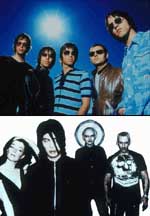
The famously egotistical self-proclaimed “next Beatles,” Oasis is the last band anyone would expect to come up with a self-deflating album title. But the very name of Standing on the Shoulder of Giants (Epic/550/Work) seems to acknowledge that even Oasis’s best work merely revisits the kaleidoscopic pop of late-sixties Beatles and the British-class-conscious rock of the Jam. Ironically, just as the members of Oasis finally seem to have realized how derivative they are, they release an album that’s strikingly original – at least by their own standards.
Oasis’s last album, Be Here Now, contained such blatant swipes of the Beatles catalogue – even song titles like “It’s Getting Better (Man!)” sound like they could be cribbed from the White Album – that the Gallagher brothers’ famously cocky shoulders sagged beneath the weight. But Standing is a noticeable departure from form, and not just because Noel and Liam Gallagher have recruited a new guitarist and bassist, cleaned up their partying act, and even embraced New Agey good vibes on “Who Feels Love?” Oasis also stakes out very different sonic terrain, nodding to electronic pop, dub reggae, and sixties psychedelia. It’s hardly retiring – this is still a band that implores its listeners to “Go Let It Out” on its first single – but at least it’s more “Tomorrow Never Knows” than “A Hard Day’s Night.”
The album opens with “Fucking in the Bushes,” a blistering rush of raucous percussion, twangy guitar, and hymnlike vocals. It might seem like a laddish sex joke, but it’s inspired by a police officer’s complaint of “kids running around naked, fucking in the bushes” at the chaotic Isle of Wight festival in 1970, and its aural blur sets the tone for the tape loops and tabla on “Who Feels Love?,” the pulsing Mellotrons on “Little James,” and the synth squiggles on “Put Yer Money Where Yer Mouth Is.” Noel Gallagher still writes clichéd couplets like “Ordinary people are not like you and me / We’re the keepers of their destiny,” but Standing boldly goes where Oasis has never been before: the future.
If there’s any American band that could use a self-deflating album title, it’s the Smashing Pumpkins (whose previous achievements in nomenclature include Pisces Iscariot and Mellon Collie and the Infinite Sadness). Unfortunately, on the Pumpkins’ new Machina/The Machines of God (Virgin), front man Billy Corgan – who has seen the commercial reach of his sweeping, multi-tracked alternative rock wane next to shiny, happy popsters like Smash Mouth – is too busy proclaiming his relevance to bother coming down to earth. “You know I’m not dead!” he howls as the album opens, but Corgan’s tortured high-mindedness renders Machina lifeless, aside from some surprising feedback on “The Everlasting Gaze” and “Heavy Metal Machine.” Over music that follows grunge’s quiet-loud-quiet dynamic, Corgan alternates between a whine and a whisper, veering from the redeeming power of love (“Only love can win,” he croons on “This Time”) to the redeeming power of love of music (“I’m alone / Radio, please don’t go” he pleads on “I of the Mourning”). He poses as the unspoiled innocent but ends up clinging to his childhood the way Courtney Love holds on to her punk-rock roots – as a last grasp for credibility.
In brief: The stockbrokers getting down to the notorious B.I.G. in Boiler Room are onto something – hip-hop has become a single-minded soundtrack to the roaring bull market and the Rolexes that go with it. Alternatives to the cash-money crowd have been slim, but Wu-Tang Clan rapper Ghostface Killah has bucked the genre’s trend (as well as his own group’s malaise) on Supreme Clientele (Epic/Razor Sharp), an album that sublimely blends sixties pop, Memphis soul, and bits of comic-book dialogue into a pop-art masterpiece reminiscent of Beck’s Odelay.